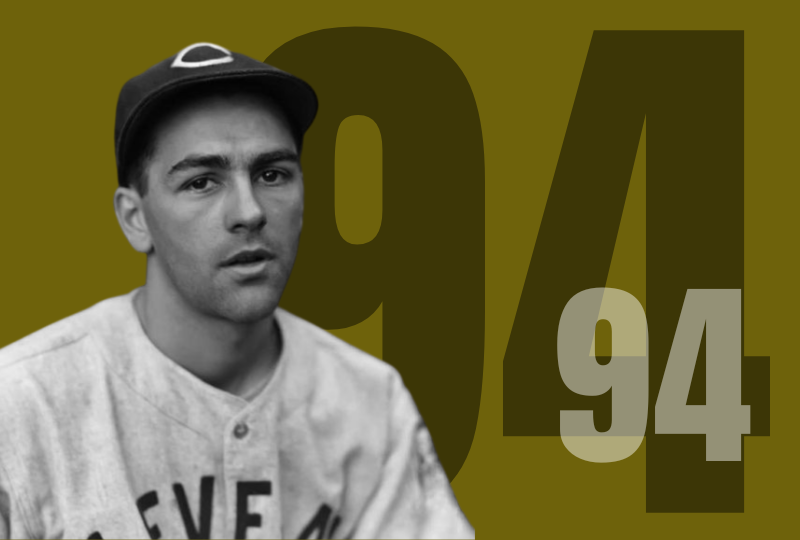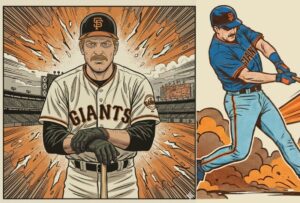Hall of Fame shortstop Lou Boudreau ranks at #94 on our list of The 100 Greatest Baseball Players Of All-Time.
Probably no other individual in history won a pennant and World Series for spite. But that’s what Lou Boudreau did in 1948.
The object of Lou’s prideful venom was the team owner: Bill Veeck, who had a pretty large chip on his shoulder too.
All Boudreau did in ’48 was hit .355 with 199 hits, 34 doubles, 18 home runs, and 106 RBI. He played in all but two games and Cleveland won their first pennant in nearly three decades. The team finished in a flatfooted tie with the Red Sox, and in a one-game playoff to decide the flag at Fenway Park, Boudreau went 4-for-4 with a pair of home runs. In the World Series, Handsome Lou drove in three more runs and the team won the championship. Cleveland is still waiting to repeat that feat.
But Lou didn’t just do those things in 1948. Had it been so, that would have been enough to make him one of the most important shortstops in baseball history. No, Boudreau was also the manager of the Indians that season. Considering all he did: playing a brilliant shortstop, managing the roster, making the pitching changes, coddling the egos of a veteran clubhouse, and navigating the delicate situations of a newly integrated team, his was one of the most amazing seasons any man has ever produced in baseball history.
But just two years earlier, Veeck had tried to trade his shortstop and remove the managerial reins from Lou’s clutches.
“I liked Lou,” Veeck said later, “but when I bought the team I wanted him to do one thing: play shortstop. I didn’t think my star should be managing too. When I couldn’t convince [Boudreau] to step down I decided to trade him.”
The Browns agreed in principle to a deal for Boudreau in 1947, but it fell through when St. Louis could not satisfy Lou’s demands to be paid like a manager/player.
“The best and worst thing I ever did was try to get rid of Boudreau,” Veeck said. “He got back at me by winning the pennant and World Series.”
Indeed, the city of Cleveland probably would have revolted against Veeck had he succeeded in trading their star shortstop/manager. The team had elevated Lou to the position in 1942 when the Illinois native was just 24, making him the youngest manager in baseball history.
When fans got word in 1947 that Veeck was trying to deal Lou, throngs of them showed up at the team offices to protest. Newspaper editorials criticized Boudreau and threatened a boycott. That was enough to make Wild Bill rethink his strategy. His reward was the magical ’48 season.
Boudreau was a superstar before he ever wore the uniform of the Indians. At the University of Illinois, Lou was a two-sport star in basketball and baseball. He preferred the court to the diamond, but in the late 1930s, there was more money and fame in baseball. In 1939 he took over at short and held that position in Cleveland for more than a decade. He was a five-time All-Star, and in 1948 he was named American League Most Valuable Player.
“I never worried about anything hit to the left of me,” said teammate and third baseman Ken Keltner. “Lou would get it.”
Boudreau was a fundamentally gifted athlete. He was known as one of the smartest players in baseball, even at a young age. He revised the defensive shift and made it even more dramatic, employing it against Ted Williams and other great hitters. He also learned to rely on his catcher to help manage the pitching staff. Jim Hegan became one of his best friends, and the two men basically spoke a secret language when they were in the field defensively, calling pitches and plays.
He was always on the lookout to get two outs instead of one: Boudreau still holds the AL record for most seasons leading the league in turning double plays by a shortstop, with five.
After the Indians let him go, Boudreau played for and later managed Boston. He never again won a pennant, but managed more than 2,400 games, his last for the Cubs in 1960, returning him to his beloved Illinois.
Maybe he had to be in the field, hovering over the dusty infield, staring at his catcher and the enemy batter to be effective. Maybe that’s why Boudreau’s success as a skipper came when he was young and still sweating as a player under the heavy flannels of a uniform.
“I loved beating the other team,” Boudreau said years later. “The best feeling is knowing you did everything to defeat your opponent, that they couldn’t stop you.”
Boudreau was elected to the Baseball Hall of Fame in 1970. Bill Veeck sent a congratulatory telegram. According to Mrs. Boudreau, Lou tossed it in the waste basket. “He never read it,” she said.
RELATED
The Cleveland Indians/Guardians All-Time Team >
The 100 Greatest Shortstops Of All-Time >






